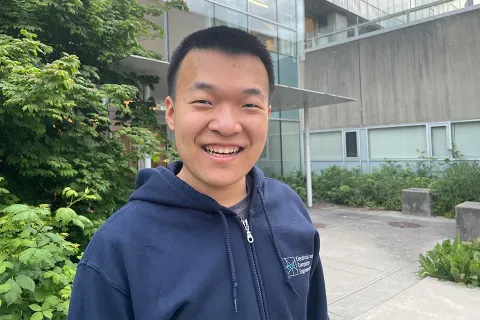"Ask questions, take risks, and make mistakes. Nobody will make you if you don’t."

Fisher Xue
- Degree:
- Bachelor of Applied Science
- Grad year: 2022
- Program:
- Campus: Vancouver
I am graduating from computer engineering this year having found an interest in computer architecture and machine learning. I grew up in Vancouver and attended high school on campus at the University Transition Program.
Over the course of my degree, I worked as a research assistant with the ECE department here at UBC, as a performance modeling engineer at Intel, and as a researcher at Huawei Canada. I co-authored two conference papers: a poster at NeurIPS 2021 and a spotlight at ICLR 2022. I was a teaching assistant for five courses in the CPSC and CPEN departments at UBC and helped to organize events with UBC IEEE. In the fall, I will be moving to Cambridge to pursue a Ph.D. at MIT.
Why did you choose to go into your field of study at UBC?
Growing up, I read a lot of science fiction and played a lot of video games. While science fiction gave me a window into what could be achievable with technology, video games gave me the need to tinker with computers and helped to develop my passion for them. However, when applying to UBC, I had to make a choice between computer science in the Faculty of Science and computer engineering in the Faculty of Applied Science. In the end, the collaborative atmosphere and community offered by engineering pushed me toward computer engineering and I am grateful that it did.
What has made your time at UBC memorable?
As a teaching assistant for five courses over six semesters, I loved the opportunity to interact with other students through labs, tutorials, and office hours. Getting to work with students and professors from a wide range of backgrounds was an experience that taught me both how to overcome gaps in communication and how to accept when I don’t know something. Moreover, I got the chance to connect with many students and even ended up as classmates with some of them later on.
What have you learned that is most valuable?
Engineering relies on teamwork and communication to solve problems. Over the course of many group projects and collaborative work experiences, I learned how to recognize others’ strengths and weaknesses and realized that one person does not have to be perfect at everything for a group to succeed. In fact, a fresh perspective or an unusual idea was often the key to solving problems that I got stuck on.
What advice would you give a student entering your degree program?
Take risks and do things outside of your comfort zone. UBC offers so many things to do and there’s very little to lose by taking a chance. Join a design team to work on something you have zero background in, organize events for the broader community, work in a research lab, become a TA, or take any of the countless opportunities available to you. Don’t be afraid of reaching out to people or asking questions and don’t be afraid of making mistakes. The person that cares the most about it is usually you.
How did your studies in the Faculty of Applied Science prepare you for the future of work?
While the Faculty of Applied Science has certainly educated me on computers, it has also taught me how to approach problems from an engineering perspective. Regardless of where the future goes, I will always have a passion for learning and will always have experience solving tough problems. I am excited to see what the future of work holds and how computing will fit into it.



